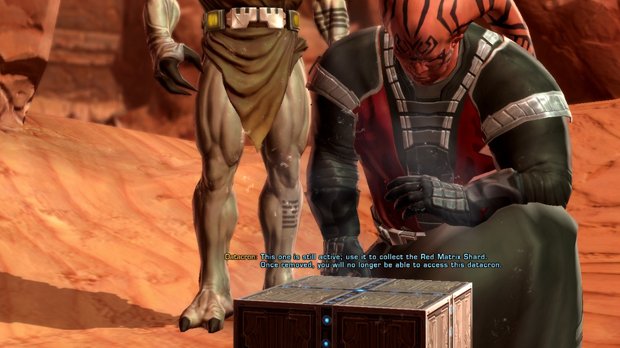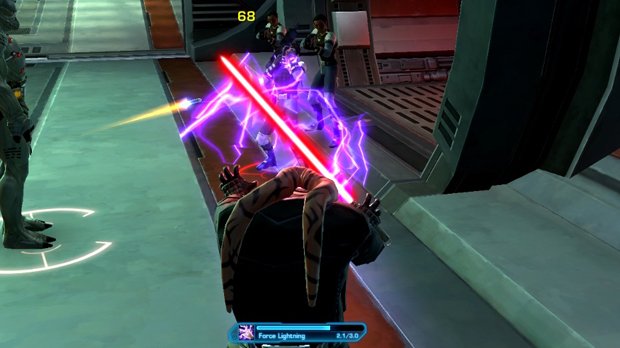Star Wars: The Old Republic review diary, level 1-15
We start our long, winding journey to the Dark Side
We also abused another companion ability: sending Khem back to town to sell our vendor trash items. It was a bit glitchy (sometimes he would just stare at us and refuse to leave until we dismissed him and brought him back out), but we could usually get it to work, and it sure beats the hell out of schlepping back to town to sell stuff before continuing into a dungeon. We just hit a button, laugh as Khem groans and disappears, and then wait a minute for him to return with our money. In only 60 seconds we have a few extra dollars and a clear inventory without having to head back into town to sell. That said, we still wish we had the ability to automatically sort our inventory or hit a “sell all vendor trash” button to do it ourselves, but we’re not about to complain about hacking a lackey to the legwork for us.

Above: Holocrons, scattered around the planets, give permanent stat boosts when discovered
Getting some class
Also on the Imperial Fleet we were asked to specialize Hollander’s class. While there are only eight classes total (Trooper, Smuggler, Jedi Knight, Jedi Consular, Sith Warrior, Imperial Agent, Sith Inquisitor, Bounty Hunter), each is essentially two classes in one. Our Sith Inquisitor, for instance, had to decide at level 10 if he wanted to be a strictly DPS character (a Sith Assassin) or a primary healer (Sith Sorcerer). Each opens up its own unique skill tree, making it much more complex than simply choosing a mastery in World of Warcraft. We felt like it was more akin to Rift’s Soul system, though it was far simpler and less customizable.
Once you pick a specialty you can’t switch, so we went with the Sorcerer, mainly because we wanted to be able to find groups easier (everyone loves a healer!). Overall we like the class so far, though we were surprise to see how little healing we got by level 15. We can see that we’re going to get more soon, but we only got a few healing moves right away, and were forced to use our crowd-control abilities to keep our allies safe in large group battles, instead of being able to just sit back and pound the healing button.
Flashpoints are flashy
And once we were finished crafting, picking our skills, leveling up, and being yelled at by Khem, we went on our first Flashpoint. In SWTOR, the game’s instanced dungeons are called Flashpoints, and act as extremely story-based missions that take between one to two hours and require a few players in a party to complete. The one we did was called The Black Talon, and required us to board a Sith ship to deal with a captain that wasn’t following orders. After “dealing” with him (we actually let him live in order to get Light Side points, which we’ll explain at another time), we had to fight our way onto an enemy ship in order to capture a defector. It was extremely fun, besting most of the missions in other MMOs thanks to the story.

Above: Unlimiteeeeeeeeeeedddddddddd... POWERRRRRRRRRRRR!
A long, long time from now…
Once we finished the two-person Flashpoint we continued to the next planet and finished up our story missions, and eventually hit level 15, at which point we started to explore the game’s PVP warzones (which are surprisingly awesome). Oh, and we got our very own starship – but that all happened after we hit level 15. To find out more about that (and to see how Hollander’s story continues) you should check back next week for the second part of our Star Wars: The Old Republic review diary!
Sign up to the GamesRadar+ Newsletter
Weekly digests, tales from the communities you love, and more
Hollander Cooper was the Lead Features Editor of GamesRadar+ between 2011 and 2014. After that lengthy stint managing GR's editorial calendar he moved behind the curtain and into the video game industry itself, working as social media manager for EA and as a communications lead at Riot Games. Hollander is currently stationed at Apple as an organic social lead for the App Store and Apple Arcade.



